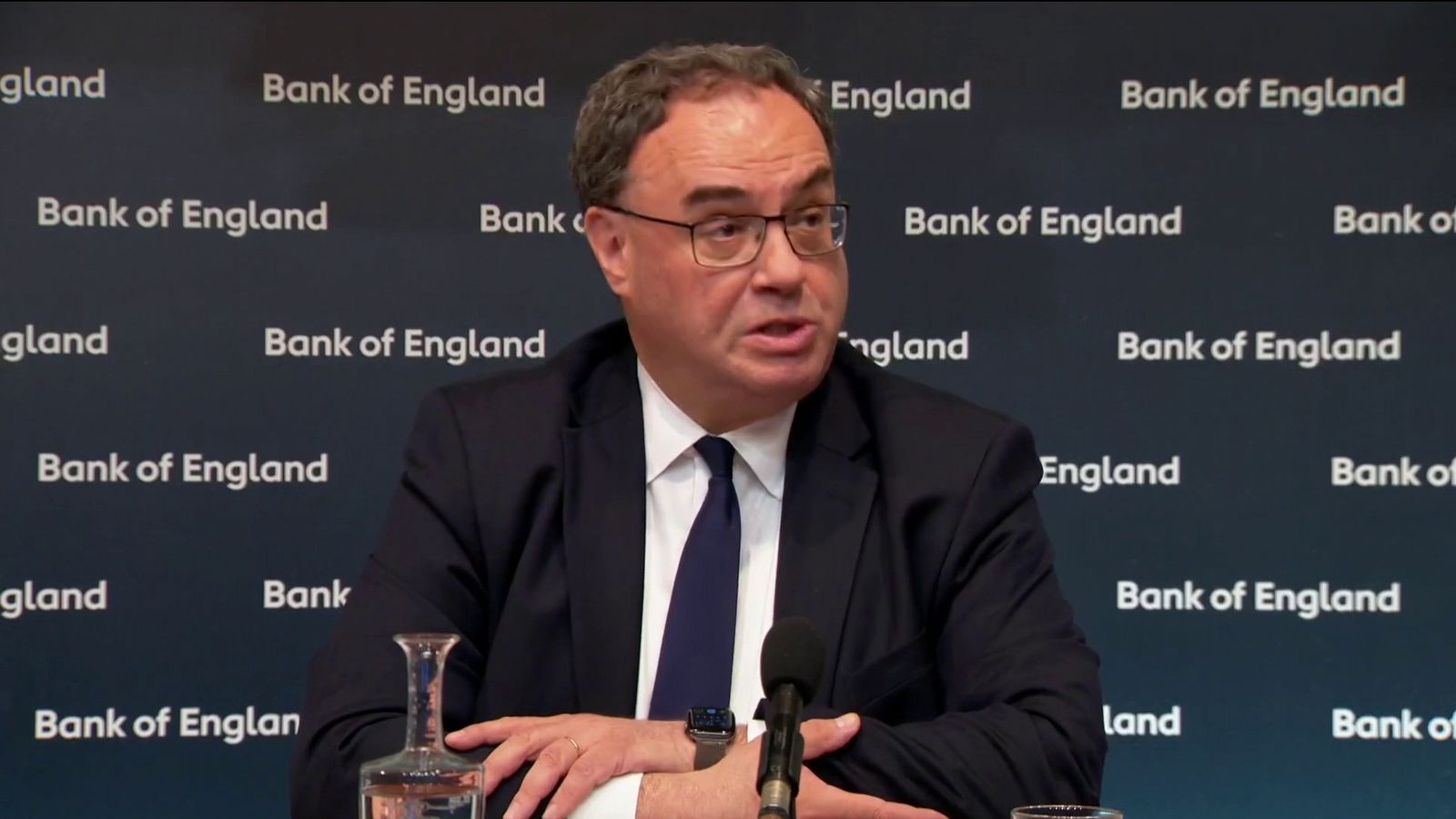The governor of the Bank of England has told Sky News he expects inflation to fall “rapidly” in just weeks – but warned two thirds of the pain from interest rate rises is yet to come.
Andrew Bailey made the comments after interest rates were increased for a record-breaking 12th successive time, lifting the cost of borrowing to 4.5% earlier on Thursday.
The bank’s Monetary Policy Committee also predicted there would be no recession this year, upgrading its economic growth forecasts by more than in any of its previous reports.
But when quizzed by Sky’s economics and data editor Ed Conway on the impact on mortgages and how much interest rate-related pain was still to come to borrowers, Mr Bailey said: “We think, in terms of resetting and adjustments, about a third possibly has come through so far…
“There’s quite a large proportion of mortgages yet to reset.”
The governor said around 85% of mortgages in the UK are now on fixed rates, and that changes were taking longer to filter through to millions who are due to renew their mortgages this year.
But Mr Bailey said that falling energy prices and a more “resilient” economy meant inflation was likely to plummet when new figures are released later this month.
He said: “We do think that inflation is going to fall, quite rapidly… that doesn’t happen until the April data which will come out in a couple of weeks’ time.”
‘Utter, complete incompetence’
Meanwhile, Mr Bailey also appeared to rebuke the Bank’s chief economist Huw Pill, who attracted criticism last month for saying Britons “need to accept” they are poorer.
When asked if he shared those views, the governor replied: “I think we have to be careful with the choice of words here,” but said he accepted that national income had fallen.
Be the first to get Breaking News
Install the Sky News app for free
He added: “I am very sensitive to [higher inflation]… because it’s so concentrated in the essentials of life – energy, foods – that it affects those less well-off households more, because they have a bigger share of their consumption in those essentials.”
Mr Bailey also said he “didn’t agree” with accusations that the Bank was poor at forecasting, and said the pandemic and war in Ukraine were both huge global shocks that had major economic impacts and could not have been foreseen.
He added: “What has been particularly difficult is we’ve had this succession of big shocks with no gaps in between, and we’ve had to deal with those, and we’ve had to adapt policy as those shocks and their effects come along.
“We are firmly behind the view we have now, which is why we’ve changed rates today, our future actions will be driven by the evidence and the evidence will move on.”
Please use Chrome browser for a more accessible video player
However, Professor Danny Blanchflower, a former member of the Bank of England’s monetary policy committee, blasted the decision to raise rates.
He told Sky News: “The interest rate hikes haven’t really done much and the effect is going to come down the road… it’s going to have a big impact on the housing market and it’s going to plunge the UK economy into recession.
Read more:
Bank of England interest rate increased 0.25 percentage points to 4.5%
“So they did have an alternative, they have no idea what they’re doing, they shouldn’t have been raising rates and it’s going to hurt people because the consequences of raising rates are much worse than the cost of inflation. So this is utter, complete incompetence.”
Professor Blanchflower predicted that “screeching U-turns are coming”, and said the Bank should cut rates as soon as possible.
Please use Chrome browser for a more accessible video player
He said that, along with the pandemic and war in Ukraine, the UK has “one thing which people don’t want to say, but it is Brexit” in explaining higher inflation.
“It has made it difficult to import food and difficult to get the price of food down… so price levels have remained higher than they have elsewhere,” he added.






